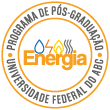Banca de QUALIFICAÇÃO: KAREN FERNANDA DE PAULA
Uma banca de QUALIFICAÇÃO de MESTRADO foi cadastrada pelo programa.DISCENTE : KAREN FERNANDA DE PAULA
DATA : 10/03/2020
HORA: 09:00
LOCAL: sala 404, 4º andar, Bloco B, Campus SA da Fundação Universidade Federal do ABC, localizada na Avenida dos Estados, 5001, Santa Terezinha, Santo André, SP
TÍTULO:
USTAINABLE ASSESSMENT OF WATER TRANSFER BETWEEN RIVERS AND BASINS IN CONTRIBUTION TO ENERGY PLANNING
PÁGINAS: 41
GRANDE ÁREA: Engenharias
ÁREA: Engenharia Ambiental
SUBÁREA: Planejamento Energético
ESPECIALIDADE: Uso Eficiente de Energia
RESUMO:
In Brazil, a large part of the electric energy comes from hydroelectric generation that has water
as its fuel, which according to the National Water Agency, despite the abundance of water in the
country, there is an imbalance between the supply of water in a region and the demand for it in
the same region. Therefore, the management of Brazilian reservoirs faces conflicts involving
the generation of electricity and multiple uses of water, such as supplying a region or even
navigation. Industrialization and economic development in some regions have also intensified
the use of water resources, and contributed to an increase in water pollution, since adequate
treatment is not made after its use to return to rivers and water sources. The transfer of water
between rivers and basins is an interesting strategy to solve the conflict of multiple uses and the
imbalance between supply and demand, in addition to providing a better use of the productivity
of hydroelectric plants. The transfer of water causes environmental impacts both in the donor
basin and in the receiving basin, so the positive impacts of the transfer should overcome the
negative impacts. This study intends to analyze the water quality parameters in the rivers involved
in the water transfer process, using the Water Quality Index (WQI), so that a study of the energy
and economic gain of this transfer can be made. Initially, the methodology of bibliographic
research and study of information contained in a computational model developed for planning the
operation of hydrothermal power systems was applied, which helps to define the optimal amount
of water to be transferred between rivers and/or basins so that the hydroelectric power plant can
generate throughout the planning period. Next, it is intended through a proposed methodology
to identify the environmental aspects generated when choosing the transfer of water in order
to increase the energy efficiency of a power plant. For the water transfer, determined, the new
concentrations of the IQA parameters were calculated, after the mixing of rivers, and the new
IQA of the receiving river. The study was carried out for the transfer of water from the Pinheiros
and Tietê Rivers to the Billings reservoir, and pointed out the need for water depollution to
make better use of the Henry Borden plant’s productivity. The depollution will also benefit the
population of the metropolitan region of São Paulo, which is supplied by the Billings reservoir
waters. The next step of this study will be the development of a module, in Java language, which
coupled with the module that determines the optimal transfer of water between rivers and basins,
can measure the environmental impact proven by this process in such a way as to guide the
decision making of the agents involved in this operation.
Keywords: water transfer, Water Quality Index (WQI), energy
MEMBROS DA BANCA:
Presidente - Interno ao Programa - 1646410 - ROSELI FREDERIGI BENASSI
Membro Titular - Examinador(a) Interno ao Programa - 1671333 - EDMARCIO ANTONIO BELATI
Membro Titular - Examinador(a) Externo à Instituição - WERNER SIEGFRIED HANISCH - UNIFESP
Membro Suplente - Examinador(a) Interno ao Programa - 1545354 - RICARDO CANELOI DOS SANTOS
Membro Suplente - Examinador(a) Externo à Instituição - JACYRO GRAMULIA JUNIOR - IFSP




